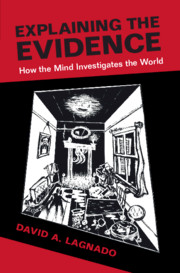Book contents
- Explaining the Evidence
- Explaining the Evidence
- Copyright page
- Dedication
- Contents
- Figures
- Tables
- Preface
- Acknowledgements
- Chapter 1 The Cliff Death
- Chapter 2 Models in Mind
- Chapter 3 Causal Modelling
- Chapter 4 Thinking beyond Biases
- Chapter 5 Expert Reasoning in Crime Investigation
- Chapter 6 Questions of Evidence
- Chapter 7 Competing Causes
- Chapter 8 Confirmation Bias
- Chapter 9 Telling Stories
- Chapter 10 Idioms for Legal Reasoning
- Chapter 11 Causal Reasoning in a Time of Crisis
- References
- Index
Chapter 6 - Questions of Evidence
Published online by Cambridge University Press: 20 October 2021
- Explaining the Evidence
- Explaining the Evidence
- Copyright page
- Dedication
- Contents
- Figures
- Tables
- Preface
- Acknowledgements
- Chapter 1 The Cliff Death
- Chapter 2 Models in Mind
- Chapter 3 Causal Modelling
- Chapter 4 Thinking beyond Biases
- Chapter 5 Expert Reasoning in Crime Investigation
- Chapter 6 Questions of Evidence
- Chapter 7 Competing Causes
- Chapter 8 Confirmation Bias
- Chapter 9 Telling Stories
- Chapter 10 Idioms for Legal Reasoning
- Chapter 11 Causal Reasoning in a Time of Crisis
- References
- Index
Summary
Chapter 6 examines the legal concept of evidence and the key dimensions of relevance, strength and reliability. I argue that a purely probabilistic conception of evidence is insufficient and present a causal perspective on evidence. The causal approach provides a unified framework to capture the interrelations between hypotheses and evidence and helps us to assess probabilistic relevance and strength. This perspective lays the foundation for a principled approach to modelling legal cases, which I develop in Chapter 10.
Information
- Type
- Chapter
- Information
- Explaining the EvidenceHow the Mind Investigates the World, pp. 132 - 155Publisher: Cambridge University PressPrint publication year: 2021
